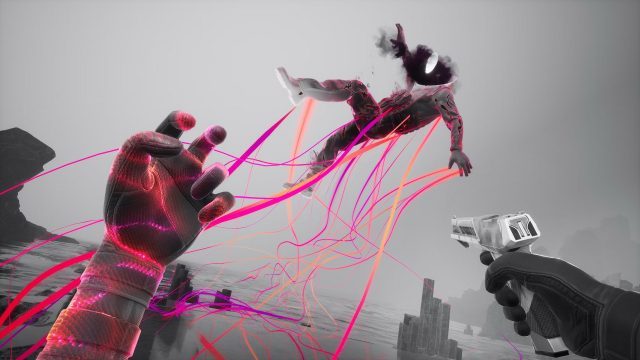Having been exclusively building VR games since 2013, nDreams stands as one of the most veteran VR-exclusive game studios to date. And with more than 200 people, one of the largest too. The studio’s CEO & founder, Patrick O’Luanaigh, continues to bet his company’s future on the success of VR.
Speaking exclusively to Road to VR ahead of a presentation at GDC 2023, Patrick O’Luanaigh talks about the growing success of nDreams and why he’s still doubling down on VR.
Starting in 2013, O’Luanaigh has navigated his company from the earliest days of the modern VR era to now, which he believes is VR’s biggest moment so far—and growing.
Between the company’s own internal data and some external sources, O’Luanaigh estimates that VR’s install base is around 40 million headsets across the major platforms, excluding the recently launched PSVR 2. At least half of that, he estimates, is made up by 20 million Quest headsets.
While it’s been a challenge to keep all those headsets in regular use, O’Luanaigh says the size of the addressable VR market today is bigger than ever.
That’s why he’s bulked up the company to some 200 employees, nearly doubling over the course of 2022 through hiring and studio acquisitions.
O’Luanaigh says, “this is the biggest we’ve ever been and it’s showing no signs of slowing down. […] In a decade of exclusively making VR games, we’ve never seen that growth before.”
O’Luanaigh knows well that content is key for getting players into their headsets, and to that end his efforts to scale the company are about building bigger and better VR content to keep up with the growth and expectations of the install base, he says.
“Setting up our fully-remote nDreams studios, Orbital and Elevation, was significant for us in establishing a powerful basis for developing multiple projects in parallel,” he says. “It gives us the specialism to develop the variety of VR titles, across multiple genres, that the growing market now demands.”
O’Luanaigh points to nDreams developed and published titles Phantom: Covert Ops (2020), Shooty Fruity (2020), Fracked (2021), and Little Cities (2022) as some of the most successful VR games the studio has launched thus far, with Phantom: Covert Ops specifically finding “important commercial success” on Quest 2.
With the release of those titles over the years and their ongoing sales, O’Luanaigh shares that nDreams doubled its year-over-year revenue over the last 12 months. And with multiple new projects in the works, including Synapse, Ghostbusters: Rise of the Ghost Lord, and other (unannounced) projects, he believes the company is on track to more than double annual revenue again by 2024.

Though he’s leading a company of 200 employees, O’Luanaigh calls himself a “massive VR enthusiast,” and is still very clearly in touch with makes VR such a unique and compelling medium.
He says his studio aims to build around five key pillars that make for compelling VR content:
- Aspirational roleplay – first-person embodiment of appealing roles or characters
- High-agency interaction – tactile 1:1 mechanics in a freely explorable world
- Empowering wielding – Feel, hold, and use visceral weapons, tools, and abilities
- Emotional amplification – Immersive situations that provoke strong, diverse feelings
- Fictional teleportation – Presence within desirable locations, inaccessible in real life
And while O’Luanaigh could easily steer this studio away from VR—to chase a larger non-VR market—he continues to double down on VR as the studio’s unique advantage. Far from moving away from VR, his company is actively trying to bring others into the fold; O’Luanaigh says nDreams continues to expand its publishing operations.
“The success of Little Cities, which has just launched its free ‘Little Citizens’ update, has been a great validation of our investments into third-party publishing and we are actively on the lookout for more amazing indie developers to work with.”
With the scale that VR has now reached, O’Luanaigh believes the market is truly viable for indie developers. And that’s why he’s glad to see the rise of VR publishers (and not just his own company); having the benefit of longstanding expertise in the medium is crucial to shipping a shipping a quality VR title, and that’s why O’Luanaigh believes VR-specific publishers like nDreams will play an important role in bringing more developers and great content to VR.
[ir]
That expertise is increasingly building upon itself in the company’s VR games which have shown impressive mechanical exploration, giving the studio the chance to test lots of VR gameplay to find out what works.
Few in VR have had the gall to prove out something as seemingly wacky as a ‘VR kayak shooter’ and actually take it to market in a large scale production like Phantom: Covert Ops. And you can clearly see the lineage of a game like nDreams’ Fracked shining through in upcoming titles like Synapse. Though the game is an entirely new IP and visual direction, the unique Fracked cover system is making the leap to Synapse; a clear example of leveraging a now battle-tested mechanic to enhance future titles. But more than just a reskin of a prior shooter, nDreams continues to experiment with unique VR mechanics, this time promising to harness the power of PSVR 2’s eye-tracking to give players compelling telekinetic powers.

To that end, the studio’s lengthy experience in the medium is clearly an asset—and one that can only be earned rather than bought. Where exactly that experience will take them in the long run is unclear, but even after all the ups and downs the industry has seen, O’Luanaigh and nDreams remain all-in on VR.







